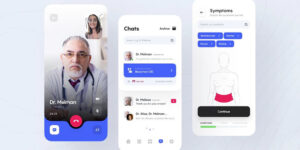
Artificial intelligence (AI) has the potential to revolutionize the healthcare industry by automating tasks, analyzing large amounts of data, and assisting healthcare providers in making informed decisions. With the ability to process and interpret vast amounts of information faster than humans, AI can help identify patterns and trends that may need to be noticed by traditional methods.
In addition, AI can help reduce the risk of errors and improve efficiency, freeing healthcare providers to focus on more complex tasks and enabling them to provide better patient care. From virtual assistants to predictive analytics, the applications of AI in healthcare are vast and varied, and the potential benefits are significant.
The entire landscape of the healthcare industry has transformed as a result of the internet and related tools. Speaking of which, consider Spectrum Internet ®. If you’re searching for a faster service that is also more dependable, secure, and reasonably priced. For both business and residential users, Spectrum provides a reliable connection. Therefore, sign up for their service and get connected.
However, as the use of AI in healthcare continues to grow and evolve, it is essential to consider the ethical implications and ensure that it is implemented responsibly, transparently, and fair way. This article will go through ‘artificial Intelligence in healthcare- role/uses of AI in healthcare.’
How is AI used in healthcare?
Artificial intelligence (AI) is increasingly used in healthcare to improve patient care and outcomes. There are many different ways that AI is being utilized in healthcare, including:
➢ Medical diagnosis:
AI can analyze medical images, such as X-rays or MRIs, to help doctors diagnose.
➢ Predictive analytics:
AI can analyze large amounts of patient data to predict outcomes, such as the likelihood of a patient developing a specific condition or responding to a particular treatment.
➢ Personalized medicine:
AI can analyze a patient’s genetic data to tailor treatment plans to the individual’s specific needs.
➢ Virtual assistants:
AI can provide patients with personalized health advice and recommendations, schedule appointments, and refill prescriptions.
➢ Clinical trial matching:
AI can match patients with clinical trials most appropriate for their specific conditions and needs.
Overall, AI has the potential to revolutionize healthcare by improving accuracy, efficiency, and patient outcomes.
Will AI replace nurses?
AI will only partially replace nurses shortly. While AI has the potential to automate specific tasks and improve efficiency in the healthcare industry, many aspects of nursing require human interaction, compassion, and judgment that machines cannot easily replace.
For example, nurses often serve as advocates for their patients and may be called upon to provide emotional support and comfort to patients and their families. They also play a critical role in coordinating care, communicating with other healthcare team members, and ensuring that patients receive the proper treatment at the right time.
That being said, AI could be used to support nurses and other healthcare professionals in their work rather than replacing them. For example, AI could be used to analyze patient data and provide recommendations to nurses, freeing up time for them to focus on other tasks. AI could also automate specific routine tasks, such as dispensing medication or checking vital signs, allowing nurses to focus on more complex and higher-level jobs. While AI may change how healthcare is delivered, it is likely to replace the critical role partially.
Future of AI in healthcare
The future of AI in healthcare looks promising, with many experts predicting that it will play a significant role in improving patient care and outcomes. Here are a few potential ways that AI could shape the future of healthcare:
➢ Personalized medicine:
AI could analyze a patient’s genetic data and medical history to develop customized treatment plans tailored to their specific needs. This could lead to more effective and efficient healthcare, as treatments are more likely to succeed if tailored to an individual’s unique characteristics.
➢ Predictive analytics:
AI could analyze large amounts of patient data to predict outcomes and identify patterns humans may miss. This could help healthcare providers to identify potential problems early on and take preventative action to avoid them.
Also Read: PIPEDA Compliance: Guide for Healthcare Providers in the USA
➢ Improved diagnosis:
AI could be used to analyze medical images and other diagnostic data to improve the accuracy of diagnoses. This could reduce the number of misdiagnoses and improve patient outcomes.
➢ Virtual assistants:
AI-powered virtual assistants could provide patients personalized health advice and recommendations, schedule appointments, and refill prescriptions. This could make healthcare more accessible, particularly for rural or underserved areas.
➢ Clinical trial matching:
AI could be used to match patients with clinical trials most appropriate for their specific conditions and needs. This could speed up the development of new treatments and bring them to market more quickly.
Overall, the future of AI in healthcare looks bright, and it has the potential to improve patient care and outcomes significantly.
Also See: Chatbots vs Conversational AI: What is the difference?
What are the kinds of AI that can be used in healthcare

Various types of artificial intelligence can be applied in the field of healthcare. Here are a few examples:
➢ Machine learning AI:
This type of AI involves training algorithms on a large dataset, allowing the system to learn and improve over time without being explicitly programmed. Machine learning AI can be used in healthcare to predict patient outcomes, identify patterns in medical data, and improve diagnostic accuracy.
Computer vision AI uses advanced image recognition algorithms to analyze medical images, such as X-rays or MRIs. Computer vision AI can be used in healthcare to detect abnormalities or diseases or to assist with surgical procedures.
➢ Predictive analytics AI:
This type of AI involves using statistical models and machine learning techniques to predict future outcomes. In healthcare, predictive analytics AI can forecast patient demand, identify risk factors for certain diseases, or predict the likelihood of specific patient outcomes.
➢ Robotic process automation:
This type of AI involves using software robots to automate repetitive tasks, such as data entry or scheduling appointments. Robotic process automation AI can free up healthcare providers’ time and allow them to focus on more complex tasks.
➢ Virtual assistants AI:
This type of AI involves using natural language processing to enable conversation with a computer in a way that feels natural to humans. Virtual assistants AI can be used in healthcare to assist patients with booking appointments, answering questions, or managing their medical records.
Overall, AI has the potential to improve healthcare significantly by automating tasks, analyzing large amounts of data, and assisting healthcare providers in making informed decisions.
Conclusion
Artificial intelligence has the potential to significantly improve the healthcare industry by automating tasks, analyzing large amounts of data, and assisting healthcare providers in making informed decisions. While the use of AI in healthcare is still in its early stages, it has already demonstrated significant benefits and has the potential to transform the way healthcare is delivered.
However, it is essential to approach the use of AI in healthcare with caution, considering the potential ethical implications and ensuring that it is implemented in a way that is responsible, transparent, and fair. Furthermore, as AI in healthcare continues to evolve, it will be essential to monitor its progress and ensure that it is used to benefit both healthcare providers and patients. We hope this article on artificial intelligence in healthcare- role/uses of AI in healthcare is useful to the readers.






